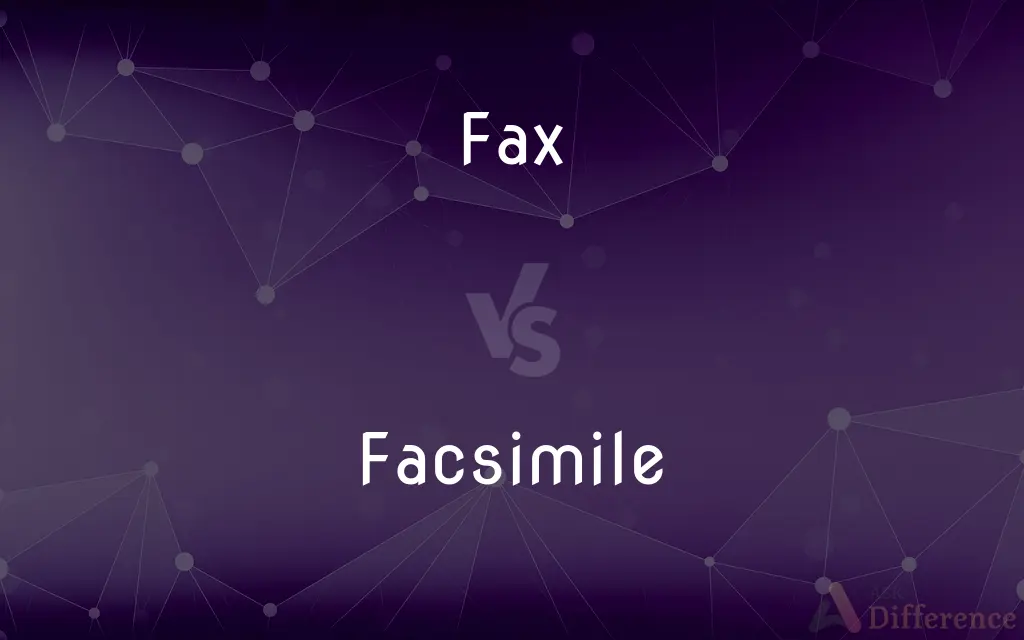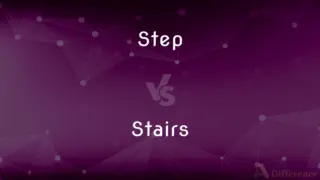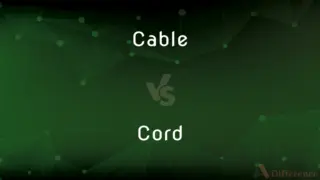Fax vs. Facsimile — What's the Difference?
Edited by Tayyaba Rehman — By Fiza Rafique — Updated on June 2, 2024
Fax is a shortened form of facsimile, both referring to a system of transmitting and reproducing printed material or images via telecommunication links.

Difference Between Fax and Facsimile
Table of Contents
ADVERTISEMENT
Key Differences
"Fax" and "Facsimile" both refer to the transmission of scanned printed materials (both text and images) from one party to another. "Fax" is simply the shortened, colloquial term for "facsimile." The term "fax" has become synonymous with the actual machine as well as the process of sending the documents. On the other hand, "facsimile" is the formal term and is less commonly used in everyday language.
"Fax" may also function as a verb, describing the action of sending a document through a fax machine. For example, you might hear someone say, "I will fax the documents to you by noon." "Facsimile" is typically used as a noun and is less commonly used as a verb. It is more likely to be found in formal writing or documentation.
The term "fax" is often associated with speed and convenience, reflecting the technology's purpose of quick communication. It implies the use of a fax machine or now, even software that can send a fax via the internet. "Facsimile" carries a more technical and formal tone and may be used in legal contexts to describe a copy or reproduction of a document.
"Fax" has also been adopted into more general usage beyond its original meaning, used metaphorically to refer to something that is an exact copy. For example, one might refer to a person who looks very similar to another as their "fax." "Facsimile," while it also means an exact copy, is less likely to be used in this metaphorical sense.
In technology terms, "fax" is used as shorthand for the modern method of fax communication, which includes digital or electronic fax services. "Facsimile," in contrast, retains a sense of the original technology, referring to the exact copies of texts or images, not necessarily limited to the context of telecommunication.
ADVERTISEMENT
Comparison Chart
Common Usage
Commonly used as both a noun and a verb
Primarily used as a noun
Connotation
Implies speed and convenience
Implies formality and exactness
Technological Association
Associated with both traditional and electronic methods
Often associated with traditional method of copying
Length of Term
Shortened form
Full, formal term
Metaphorical Usage
Sometimes used metaphorically
Rarely used metaphorically
Compare with Definitions
Fax
A device for sending documents electronically over a phone line.
She sent the contract via fax.
Facsimile
Often used to describe printed reproductions of old books.
The publisher specializes in facsimiles of ancient texts.
Fax
Used as a verb meaning to send a document via a fax machine.
Please fax your application to the HR department.
Facsimile
A system for transmitting and reproducing documents.
The facsimile machine was invented in the 19th century.
Fax
The act of sending a document this way.
I will fax the report to you.
Facsimile
The full term for "fax," less common in casual use.
A facsimile of the document is legally binding.
Fax
To transmit a document electronically to a specified destination.
Fax this to our branch office.
Facsimile
A precise duplicate or replica.
They created a facsimile of the painting for the exhibit.
Fax
Fax (short for facsimile), sometimes called telecopying or telefax (the latter short for telefacsimile), is the telephonic transmission of scanned printed material (both text and images), normally to a telephone number connected to a printer or other output device. The original document is scanned with a fax machine (or a telecopier), which processes the contents (text or images) as a single fixed graphic image, converting it into a bitmap, and then transmitting it through the telephone system in the form of audio-frequency tones.
Facsimile
A facsimile (from Latin fac simile, "to make alike") is a copy or reproduction of an old book, manuscript, map, art print, or other item of historical value that is as true to the original source as possible. It differs from other forms of reproduction by attempting to replicate the source as accurately as possible in scale, color, condition, and other material qualities.
Fax
A fax machine.
Facsimile
An exact copy or reproduction, as of a document.
Fax
A document transmitted or received by a fax machine. In both senses also called facsimile.
Facsimile
See fax.
Fax
To transmit (a document) by a fax machine.
Facsimile
Of or used to produce exact reproductions, as of documents.
Fax
The hair of the head.
Facsimile
Exactly reproduced; duplicate.
Fax
Senseid|en|machine}} {{ellipsis of fax machine
Facsimile
(countable) A copy or reproduction.
Fax
A document sent, or received and printed by a fax machine
Facsimile
(uncountable) Reproduction in the exact form as the original.
Fax
To send a document via a fax machine.
Facsimile
A fax, a machine for making and sending copies of printed material and images via radio or telephone network.
Fax
Alt form of facts.
Facsimile
The image sent by the machine itself.
Fax
Duplicator that transmits the copy by wire or radio
Facsimile
(transitive) To send via a facsimile machine; to fax.
Fax
Send something via a facsimile machine;
Can you fax me the report right away?
Facsimile
(transitive) To make a copy of; to reproduce.
Fax
A document that has been transmitted electronically.
Did you receive the fax I sent?
Facsimile
A copy of anything made, either so as to be deceptive or so as to give every part and detail of the original; an exact copy or likeness.
Facsimile
To make a facsimile of.
Facsimile
An exact copy or reproduction
Facsimile
Duplicator that transmits the copy by wire or radio
Facsimile
Send something via a facsimile machine;
Can you fax me the report right away?
Facsimile
An exact copy or reproduction of a document.
The museum displayed a facsimile of the original manuscript.
Common Curiosities
Is a digital copy sent by email considered a facsimile?
It's a facsimile in the sense of being a copy, but it's not a "fax" unless sent by fax technology.
Can "fax" be used as a verb?
Yes, "fax" can be used as a verb meaning to send a document through a fax machine.
What is a facsimile?
A facsimile is an exact copy, often of a document, transmitted through a facsimile machine.
What is a fax?
A fax is a document transmitted electronically via a fax machine or an electronic fax service.
Are faxed documents legally binding?
Yes, faxed documents can be legally binding.
What's needed to send a fax?
You need a fax machine or online fax service, the document, and the recipient's fax number.
Is "facsimile" a technical term?
Yes, it's the technical term for an exact copy, often used in legal or formal contexts.
Can I fax internationally?
Yes, you can send faxes internationally, but it may incur higher costs.
Can I send a fax from a computer?
Yes, you can send a fax from a computer using electronic fax services.
What does "fax" stand for?
"Fax" is short for "facsimile."
Do people still use fax machines?
Yes, fax machines are still used, though less commonly due to digital alternatives.
Is faxing secure?
Faxing is generally secure, though not as secure as encrypted digital communication methods.
Why might someone choose a facsimile over a digital scan?
Facsimiles can be used for legal or archival purposes where exact copies are necessary.
How does a fax machine work?
A fax machine scans a document, converts it into electronic signals, and transmits it to another machine.
Do facsimiles include signatures?
Yes, facsimiles can include signatures, which are copied along with the rest of the document.
Share Your Discovery

Previous Comparison
Step vs. Stairs
Next Comparison
Cable vs. CordAuthor Spotlight
Written by
Fiza RafiqueFiza Rafique is a skilled content writer at AskDifference.com, where she meticulously refines and enhances written pieces. Drawing from her vast editorial expertise, Fiza ensures clarity, accuracy, and precision in every article. Passionate about language, she continually seeks to elevate the quality of content for readers worldwide.
Edited by
Tayyaba RehmanTayyaba Rehman is a distinguished writer, currently serving as a primary contributor to askdifference.com. As a researcher in semantics and etymology, Tayyaba's passion for the complexity of languages and their distinctions has found a perfect home on the platform. Tayyaba delves into the intricacies of language, distinguishing between commonly confused words and phrases, thereby providing clarity for readers worldwide.













































